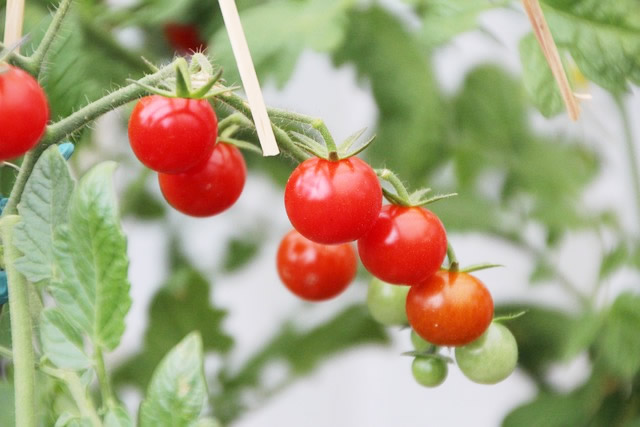今日から「The complex climate truth about home-grown tomatoes -「自家製トマトにまつわる気候の真実」を読んでいます。

You can tell these allotments have been here, on the Isle of Dogs in London, for a long time.
ロンドンのドッグ島には、昔からこのような市民菜園があったことがわかる。
allotment「割り当て、分配、分け前、分担額、特別手当、(菜園などとしての公有地の)割り当て地、市民菜園」。
Some of the sheds are former air raid shelters.
いくつかある小屋はかつての防空壕だ。
“There’s a lot of that still here from the war,”
「ここにはまだ戦時中のものがたくさん残っています」
says Paula Owen, a relatively recent arrival who has maintained her own plot for the last 10 years.
と語るのは、比較的最近、10年程前から自分の区画を管理しているポーラ・オーウェン氏。
“A lot of people make do and mend.”
「多くの人は、やりくりしつつ繕っています。
There are raised beds made of repurposed scaffolding boards.
足場板を再利用したレイズドベッドもある。
No heavy machinery.
重機は使わない。
And hazel sticks for propping up tomato and bean plants.
そして、トマトや豆の苗を支えるためのハシバミの杖。
Somewhat incongruously, the giant glass and steel towers of Canary Wharf, London’s shiny financial district, perforate the skyline to the north.
北側にはやや不釣り合いなロンドンの金融街、カナリー・ワーフの巨大なガラスと鉄のタワーがそびえている。
But next door is a city farm, says Owen: “You can hear pigs and donkeys.”
しかし隣は都会の農場だ、とオーウェンは言う「豚やロバの声が聞こえますよ。」
Owen and many like her see their allotments or urban gardens as low-impact, low-carbon contributions to their local community.
オーウェンや彼女のような多くの人々は、自分たちの菜園や庭園を、地域社会への低負荷・低炭素の貢献と考えている。
A place where you can grow your own food, with no need for plastic packaging or planes that bring in produce from abroad.
プラスチックの包装も、外国から農産物を運んでくる飛行機も必要ない。
And so she was surprised to see reports of a study published in January 2024 that suggested urban agriculture in the US and Europe is on average six times as polluting, in terms of carbon emissions, as conventional, commercial agriculture.
2024年1月に発表された、アメリカやヨーロッパにおける都市農業の炭素排出量は、従来の商業的農業の平均6倍であるという研究結果を見て、彼女は驚いた。
我が家でも、そろそろ家庭菜園の準備をしようと思っています。
トマトとキュウリは種類にこだわらないので、ダイソーで買った種でたくさん苗を作り、ナスやズッキーニは苗を買って植えつける予定です。
肥料は家庭から生ごみのコンポストが主で、それがまた作物になる・・・という小さな庭での循環を目指しています。
少しでも庭から作物が取れると嬉しいし助かります。
早速先を読んでいきましょう!
理由は単純明快!「少ないコストでしっかり楽しく学べるから」。
私自身の経験(高機能でビックリ)をびっしり書いていますので、良かったら読んでみてください。
下のバナーからどうぞ!






